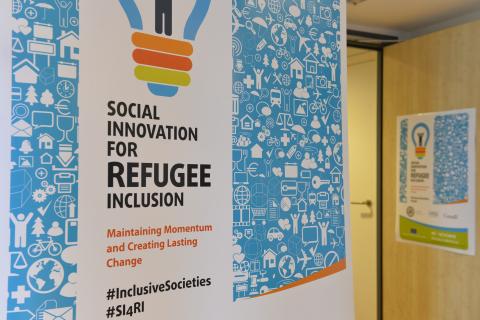European Economic
and Social Committee
Social innovation can make a difference in the area of refugee inclusion
But a systemic change in society requires people to move from fear to hope, an EESC conference reveals
The European Economic and Social Committee (EESC) hosted the conference on Social Innovation for Refugee Inclusion – Maintaining Momentum and Creating Lasting Change to explore the ways in which innovative business or social initiatives for refugee inclusion could help trigger large-scale and long-term changes that might lead to future robust societies thriving on diversity.
The conference, which took place on 16 and 17 November in Brussels, was jointly organised by the EESC, the U.S. and Canada Missions to the EU and the Migration Policy Institute Europe (MPIE), as a follow-up to the seminar on the same topic, hosted by the EESC in September 2016.
The conference brought together more than 200 social entrepreneurs, civil society organisations, business leaders, public officials, service designers and instigators of refugee initiatives from Europe, the United States and Canada.
The audience heard that, although the dramatic influx of refugees and migrants seems to have abated, the real work in this area had in many ways only just begun. The choices now made by policy-makers in relation to refugee integration will determine how societies will be shaped in the coming decades.
Social innovation – embedded in projects which help newcomers connect with the welcoming community and find their footing in their new homes by getting a job or otherwise participating in a society – can provide valuable input and complement government action in this regard.
"These are not easy times for Europe and the world," Cristian Pîrvulescu, president of the EESC's Permanent Study Group on Immigration and Integration, said in his opening remarks. "The challenges are unprecedented not only in relation to the humanitarian crisis but also in relation to a vision that puts human rights and liberties at the centre of public action."
Integration primarily happens at the local level and requires engaged host communities. Individuals, organisations or businesses – whether they are private, multinational or locally rooted – have an important role to play.
"We have to make sure that innovation does not remain confined to best practices and that its impact is long-lasting, rather than a short-term public activity that sizzles out in a year or two,"
said Elizabeth Collet, director at MPIE.
However, many projects presented at the conference are new and it is difficult to measure their success or predict whether they will be mainstreamed or scaled up. Yet, some of them are already making a difference.
One such project is From Syria with love, a social enterprise which spontaneously started as an initiative to "give purpose" to Syrian housewives in Belgium, only to evolve into a company offering Syrian cooking workshops and catering services, its founder Yara Al Adib said, adding that they have "changed mind-sets and the way Syrian women are perceived in Belgium".
Another featured project was CALM (Comme à la maison – Feels like Home), launched in France by Singa, an international network that creates opportunities for newcomers and locals to connect and learn from each other.
The CALM project invites local people to allow a newcomer to live in their home for free for between three and 12 months. The programme had a huge success in France, with 12 000 people applying. In Germany, Singa runs incubation programmes for newcomer entrepreneurs.
Among the other projects showcased were Action Emploi Réfugiés, which helps refugees find a job through a Facebook platform, and Refugee613, the Canadian coalition of citizens and partners that facilitates successful integration by organising information sessions, publishing newsletters or creating WhatsApp groups in Arabic.
The participants also took part in workshops focusing on financing social innovation, refugees in small and rural communities, improving the visibility of refugees' skills, innovative approaches to training and hiring refugees, and refugee entrepreneurship.
The solutions proposed for efficient social innovation include finding sustainable funding models, building smart networks at all levels and soliciting broader political support to make projects work.
Involving refugees from an early stage in the design of services that directly influence them is also seen as crucial. Coming up with solutions for refugees without consulting them is the same as making tea with water and sugar but no tea, the speakers said.
Although it is important to scale up such initiatives and achieve a larger impact to further foster integration, this is still not enough to provoke a systemic transformation that would lead to a resilient inclusive society. For this to happen, people must move from fear to hope, said Eric Young, visiting professor of social innovation at Canada's Ryerson University.
But in the short and mid-term, this is not easy. Higher levels of diversity in a society initially make people wary and passive, "turning them into turtles", Mr Young said, adding that this should by no means be seen as a deterrent, "no more than trying to get a rocket to the moon should mean we ignore the effects of gravity."
"If we thought that we could get to the moon just by scaling aeroplanes, we would never have gotten to the moon. It was taking the reality of gravity seriously and converting it into something that works for us," he said.
"Our moonshot is making places that thrive because of diversity, where diversity is an asset and a characteristic of social success," Mr Young concluded.
